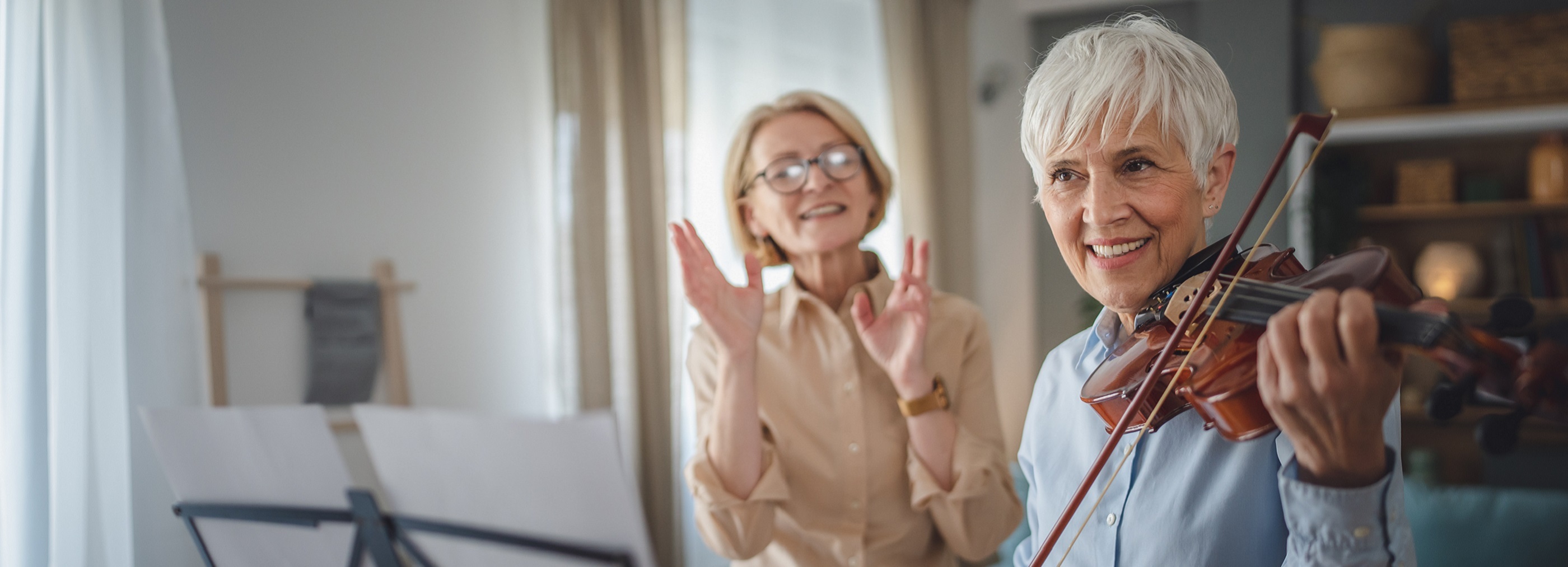
Learning without limits: empowering adult learners through Trinity College London exams
BY: Guest Writer
25 June 2025
A recent YouGov survey (January 2025) revealed that, of the 73% of Britons surveyed that say that cannot play a musical instrument, 60% would like to be able to. In this blog, David Barton from, Trinity Champion Centre, David Barton Music shares his insight into teaching adult students and how the format and flexibility of Trinity College London music exams supports their progression.
In the 25 years I’ve been a private music teacher, it’s been a great joy to see an ever-increasing number of adults seeking music lessons. Some are returners, reconnecting with their musical roots having learnt as children, but many are also beginners, just starting their musical journey. In my own teaching studio, over 60% of my students are adults, and for each one, music will mean something different to them: a lifelong dream, a post-retirement hobby, a creative outlet, and for many, cherished ‘me time’ in a busy schedule. The ability for adult learners to shape their own musical journey is important, and the ever-evolving Trinity syllabuses, alongside the development of the digital grades, have been instrumental for many of them in supporting that journey.
The joys (and realities) of adults learning
All the adults I teach lead busy lives, juggling family and work commitments, caring responsibilities, time and energy. But I am constantly reminded that amidst the busyness of their week, they remain committed and motivated; they value not just their musical journey, but the positive effects music has on their health, mental health, and well-being. Music exams aren’t for everyone, but for those who do choose to mark their progress in this way, they offer a motivating goal, and one which is even more valuable when it’s shaped to fit them, not the other way around.
Tailoring the journey: choice within the syllabus
Trinity’s ongoing commitment to diversifying and broadening the scope of the exam repertoire means that adults can choose songs and pieces which mean something to them, perhaps those to which they feel an emotional connection. This is, of course, important for any student, but adults bring with them a wealth of life experiences, and thoughtful repertoire choice can both support and challenge that experience. Whether it’s jazz, classical, folk or pop, there is always something for everyone. Trinity’s diverse repertoire allows adult learners to, not only build exam programmes which suit their own interests, but also encourages them to broaden their own musical horizons - to journey beyond the familiar.
The ability, in some cases, to select repertoire from a previous syllabus and the move towards open-ended syllabuses can reduce the pressure on adult learners who can progress in their exam preparations in the knowledge that they won’t run out of time. Several of my adult learners have found reassurance in knowing that their chosen pieces won’t expire or be withdrawn mid-preparation - particularly when often inevitable unexpected life or health challenges arise. That kind of flexibility is a quiet kindness that speaks volumes. The ability to choose between different technical aspects, such as between scales and arpeggios or exercises, offers adult learners a choice, and an opportunity play to their strengths and interests.
Digital grades: flexibility without compromise
The introduction of Trinity’s suite of digital grades and diplomas has opened the availability and accessibility of the exams. Digital exams offer adult learners the flexibility to record their performance at a time that works for them, recognising that their musical journey exists alongside a wider spectrum of responsibilities, of health challenges, caring, and shift work. This can reduce the performance anxiety for adult learners; ‘life’ happens, and not everything rests on a single performance.
The ability to select between a Technical pathway and Repertoire-only pathway again enables adult learners to take a route which we feel best matches their goals and aspirations. Some of my adult learners, shaped by difficult or discouraging performance experiences in childhood, are now using digital exams as a safe space to rebuild their confidence.
Supporting adult learners: a shared opportunity
When I look across the hugely diverse range of students in my teaching studio, I am reminded that each treads their own musical journey; one which shapes and is shaped by them. Syllabuses that offer choice - not just in repertoire, but in technical work - support that journey. The accessibility of the digital exams offers them flexibility and a mechanism through which to work towards an exam alongside the pressures of modern life. Whether they took exams as children, or are challenging themselves in later life, Trinity exams support them.
In my teaching studio, exams aren’t a tick in a box. They’re a celebration of progress, commitment, and creativity, especially for adult learners. With Trinity, the pathway is as individual as the student who walks it. As teachers, we have the privilege of guiding students not just through exams but walking alongside them on their individual musical journeys. The Trinity approach recognises that progress isn’t always linear and that, for many adults, the journey itself is the true achievement. Whether face-to-face or digital, Trinity exams allow adult learners to feel seen, supported, and celebrated.
Would you like to find out more about becoming a Trinity Champion Centre? Click here for more information.
Related posts
BY: John Molloy
BY: Guest Writer




Comments & Replies